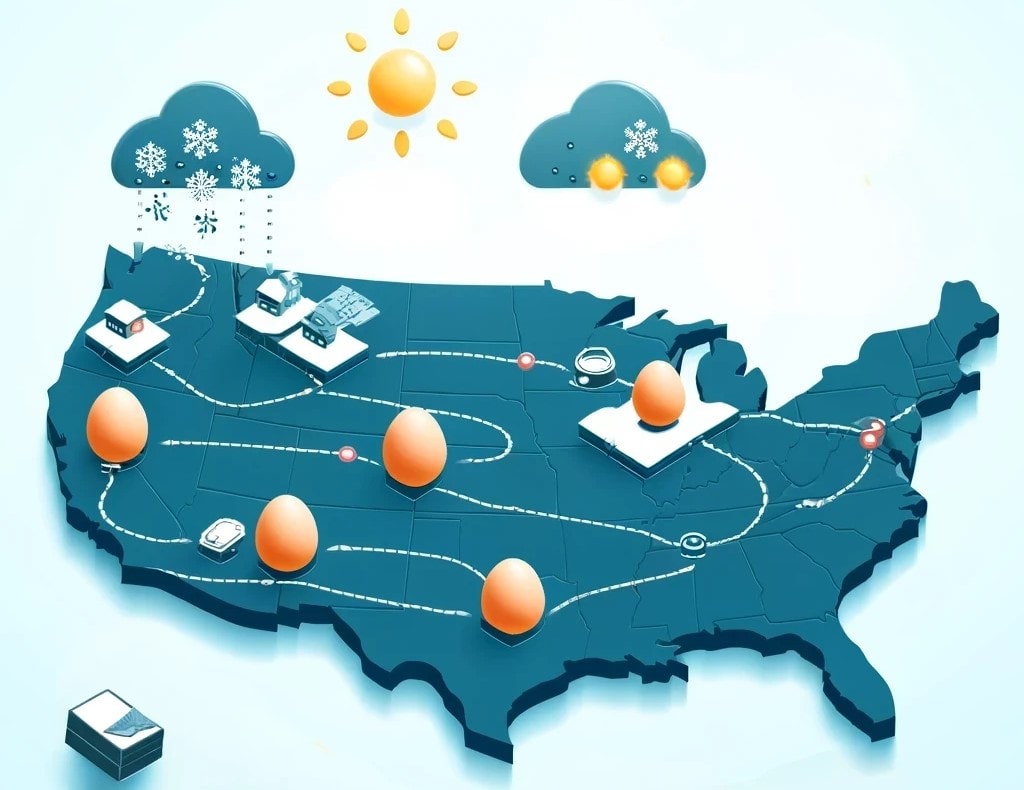Exploring the Relationship Between Weather Conditions and Egg Supply Chain
Eggs are a staple food in the United States, consumed by millions of people every day. However, the production and prices of eggs can be significantly influenced by weather conditions and temperature. In this blog post, we will delve into the relationship between weather and egg supply chain, and explore the impact of these factors on egg prices and the food market.

Understanding the Effects of Weather on Eggs
Weather plays a crucial role in egg production. Extreme weather conditions such as heatwaves, cold snaps, and heavy rainfall can disrupt the egg-laying process. High temperatures can cause stress to hens, leading to a decrease in egg production. On the other hand, extremely cold temperatures can also affect egg production, as hens may reduce their egg-laying during colder months.
Another factor that can impact egg production is avian influenza, commonly known as bird flu. Avian influenza can spread rapidly among poultry, resulting in the loss of millions of birds. This can lead to a decrease in egg supply and subsequently drive up egg prices.
Supply chain disruptions are also a concern when it comes to weather-related issues. Extreme weather events such as hurricanes, floods, and snowstorms can disrupt transportation routes and cause delays in delivering eggs to the market. These disruptions can further exacerbate the impact of weather on egg prices and availability.
Temperature’s Influence on Egg Quality and Safety
Temperature is a critical factor in maintaining the quality and safety of eggs. Eggs are highly perishable and can spoil if not stored properly. In hot weather, eggs can go bad quickly if left unrefrigerated for an extended period. It is recommended to store eggs in the refrigerator at a temperature below 40 degrees Fahrenheit to ensure their freshness and prevent bacterial growth.
On the other hand, eggs can withstand colder temperatures to some extent. Eggs can stay in 50-degree weather for a short period without significant quality deterioration. However, it is still advisable to store eggs in a cool environment to maintain their freshness.
Rainfall can also affect the quality of eggs. If eggs get rained on, their protective cuticle can be compromised, making them more susceptible to bacterial contamination. It is essential to thoroughly clean and dry eggs that have been exposed to rain before consuming or storing them.
To ensure the safety of eggs, it is crucial to know the temperature at which they are safe to eat. According to the United States Department of Agriculture (USDA), eggs should be cooked to an internal temperature of 160 degrees Fahrenheit to kill any potential bacteria.
Proper egg storage and refrigeration are vital to maintaining their quality and safety. Eggs should be stored in their original cartons in the refrigerator, away from strong-smelling foods. It is also recommended to consume eggs within three to five weeks of purchase for the best quality.


The Ripple Effect on Egg Prices and the Food Market
The impact of weather and temperature on egg production and supply chain disruptions can have a significant ripple effect on egg prices and the food market. When egg production decreases due to extreme weather conditions or avian influenza outbreaks, the supply of eggs decreases, leading to an increase in prices.
The increase in egg prices can have a direct impact on the consumer price index (CPI). As the price of eggs rises, it can contribute to inflation and affect the overall cost of living for consumers. Additionally, grocery stores and wholesale prices are also affected by the increase in egg prices, leading to higher costs for retailers and potentially higher prices for consumers.
Egg producers are particularly vulnerable to the impact of weather and temperature on egg prices. When production decreases, producers may face financial losses due to lower egg sales and increased production costs. These economic consequences can have long-term effects on the viability of egg farms and the livelihoods of egg producers.
Mitigating the Impact of Weather and Temperature on Egg Prices
To minimize losses and mitigate the impact of weather and temperature on egg prices, egg producers can employ various strategies. These strategies include implementing climate-controlled housing for hens, adopting advanced monitoring systems to detect early signs of avian influenza, and diversifying production locations to reduce the risk of supply chain disruptions.
Government interventions and support for the egg industry can also play a crucial role in mitigating the impact of weather and temperature on egg prices. Policies that provide financial assistance, insurance coverage, and research funding can help egg producers adapt to changing weather patterns and mitigate the economic risks associated with supply chain disruptions.
Technological advancements in egg production and storage can also contribute to minimizing the impact of weather and temperature on egg prices. Innovations such as improved egg storage systems, efficient transportation methods, and advanced monitoring technologies can help ensure the quality and safety of eggs throughout the supply chain.
In conclusion, weather conditions and temperature have a significant impact on egg prices and the food market in the United States. Understanding and adapting to these factors are crucial for maintaining a stable food supply chain. By implementing strategies, receiving government support, and leveraging technological advancements, the egg industry can mitigate the economic risks associated with weather-related disruptions and ensure a steady supply of affordable eggs for consumers.
faq
How does weather affect eggs?
- Temperature: Extreme temperatures, both hot and cold, can stress laying hens, affecting their egg-laying patterns. High temperatures can lead to decreased egg production and lower egg quality, while cold temperatures can slow egg production.
- Humidity: Humidity levels in the environment can influence eggshell quality. High humidity can lead to softer eggshells, making eggs more susceptible to breakage and microbial contamination.
- Seasonal Changes: Seasonal variations in daylight length can affect the hormonal balance of hens, influencing their egg-laying behavior. During shorter daylight periods, egg production may decrease.
- Storms and Inclement Weather: Severe weather events such as storms or hurricanes can disrupt egg production due to power outages, changes in environmental conditions, and stress on the birds.
Transportation and Storage: Weather conditions during transportation and storage can impact egg quality. Extreme temperatures during transit or storage can lead to condensation on egg surfaces, increasing the risk of bacterial growth and spoilage.
Do eggs go bad in hot weather?
Yes, eggs can spoil more quickly in hot weather due to increased temperatures promoting bacterial growth and hastening the breakdown of egg quality. When exposed to high temperatures for extended periods, eggs can lose moisture through the porous eggshell, leading to changes in texture and flavor. Additionally, heat can cause the proteins in eggs to denature, resulting in undesirable changes such as thinning of egg whites and yolks.
To prevent eggs from spoiling in hot weather:
- Store eggs in a cool place, ideally below 45°F (7°C), such as in the refrigerator.
- Avoid leaving eggs exposed to direct sunlight or heat sources like stoves or ovens.
- Use eggs within their recommended storage period (typically 3-5 weeks in the refrigerator) to maintain freshness.
- Check eggs for signs of spoilage such as unusual odors, sliminess, or changes in color before use.
- Discard cracked or damaged eggs promptly, as they are more susceptible to contamination.
What temperature is too cold for eggs?
Eggs can freeze and become damaged if exposed to temperatures below their freezing point, which is approximately 29-30°F (-1.7 to -1.1°C) for fresh eggs with their natural moisture content. Freezing can cause changes in the egg’s texture, especially in the egg whites, leading to a watery consistency when thawed.
How long can eggs be left unrefrigerated?
It is generally recommended to refrigerate eggs promptly after purchase and to keep them refrigerated at a temperature of 40°F (4°C) or below to maintain freshness and safety. However, there are guidelines for how long eggs can be left unrefrigerated:
- Fresh Eggs: Eggs that have not been washed or refrigerated can be kept at room temperature for a short period, typically up to 2 hours.
- Refrigerated Eggs: Once eggs have been refrigerated, they should remain refrigerated to prevent bacterial growth and maintain quality. If eggs are left out of the refrigerator for more than 2 hours at room temperature (above 40°F or 4°C), they should not be consumed and should be discarded for safety reasons.
- Cooked Eggs: Cooked eggs (hard-boiled, scrambled, etc.) should also be refrigerated promptly if not consumed immediately. Cooked eggs left at room temperature for more than 2 hours should be discarded.
Are eggs still good if they get rained on?
If eggs get rained on but the eggshell remains intact and clean, the eggs should still be safe to eat as long as they are properly handled and stored.
Why Eggs Unlimited?
As one of the largest egg producers in the U.S., Eggs Unlimited is well equipped to face any challenge. That includes increasing demand for eggs, issues with a specific farm, and challenges across the supply chain. As customers explore their egg options, our knowledge, resources, and experience can help them make smart, cost-effective choices.
At Eggs Unlimited, we partner with farmers and suppliers that care about their animals and the environment. We’re proud to work with farmers who follow robust environmental and ethical practices. Plus, with our global reach, we can take on any challenge for customers all around the world. We always have a way to meet – and exceed – our customers’ expectations.
Connect With Top Egg Producers
Connect with the Eggs Unlimited Sales team to learn more about your egg options. eusales@eggsunlimited.com
